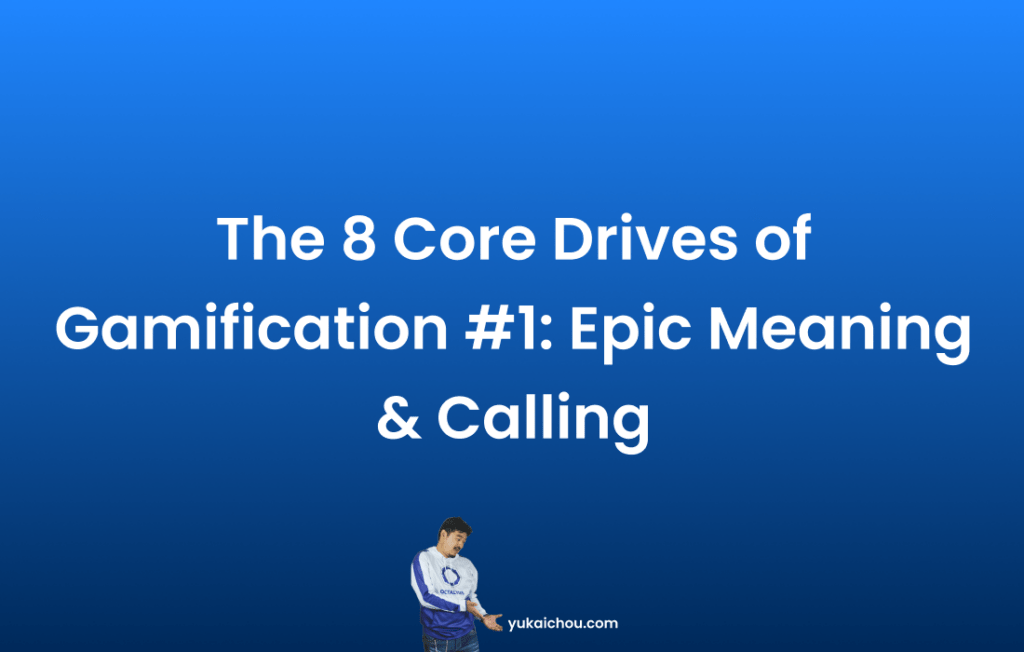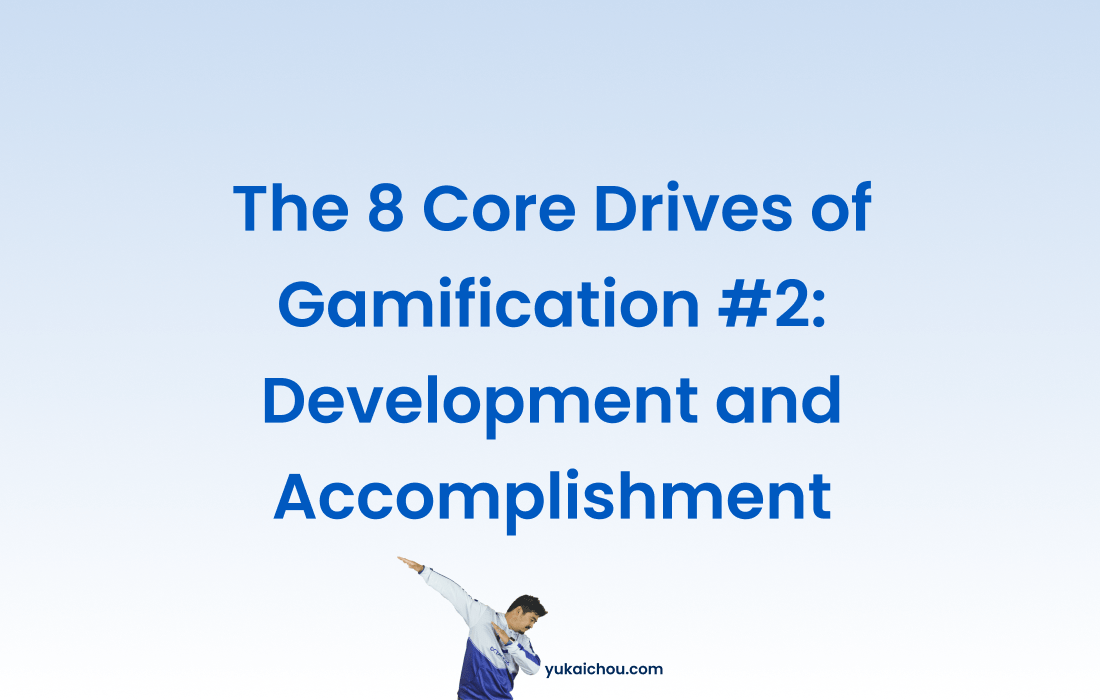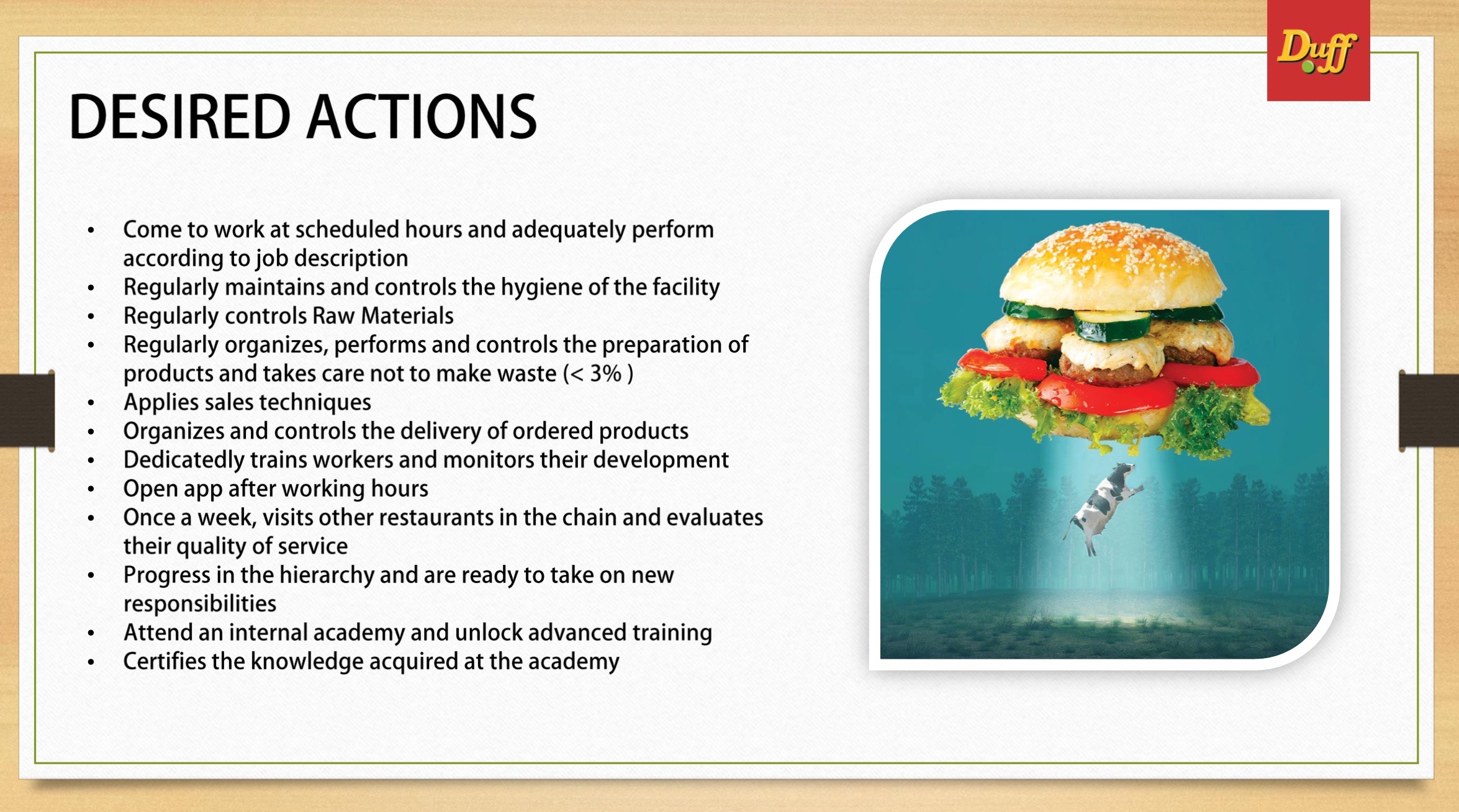The First Motivation Core Drive of Octalysis Gamification
(Below is a snippet of Gamification Book: Actionable Gamification – Beyond Points, Badges, and Leaderboards. If you like this blog post, you will LOVE the book.)
Epic Meaning & Calling is the First Core Drive of the Gamification Framework Octalysis. This is the drive where people are motivated because they believe they are engaged in something that is bigger than themselves.
Games trigger this Core Drive often. Many times in games, the world is about to be destroyed, and somehow, you as the player are the only qualified candidate to save the world. Sound exciting and motivating?
How about real life? Do we ever encounter scenarios where we are driven by Epic Meaning & Calling?
Have you ever wondered why:
- People contribute to the non-profit website Wikipedia? What would make someone spend hours updating a site that doesn’t pay her or even help her build her resume?
- Why are people so loyal to Apple products, to the extent that they know they want to buy the next product even before they know what it is?
- Why are school rivalries so engaging, driving radical behaviors such as pranks, streaking, violence, and profit for the schools?
- Why do Asian kids work so hard for their parents throughout their life?
- Why do people buy Life Insurance, giving up current cash they could enjoy for potential future cash that they know they cannot enjoy?
- At the most extreme front, why do people sacrifice and even become martyrs of ideals they believe in? Certainly it is not comfortable, and it’s hard to imagine anything they will gain from and enjoy after such a big sacrifice.
What is Epic Meaning & Calling?
Epic Meaning and Calling is the need or the urge to be a part of something much bigger than just yourself. When this drive is activated, participants choose to be members of your system and will take action not because it necessarily benefits them directly, but because it turns them into the heroes of the company’s story.
This core drive is activated when your system inspires people and gets them excited about being part of a bigger purpose or plan.
When your system or product demonstrates deep and sincere passion towards a higher vision, others will want to believe in you and be on the journey with you, even if it means foregoing financial compensation (which is our Left-Brain Core Drive #4 – Ownership & Possession).
This is where the magic happens. By activating Epic Meaning and Calling, you’ll gain active participants and grow your customer base or audience through their passion and commitment to your cause, sometimes to an irrational degree.
Epic Meaning and Calling can possibly be implemented anytime within a player’s journey, but is most often introduced when people are starting to interact with your system, which is the Discovery Phase and the onboarding phase.
But how do you instill Epic Meaning and Calling into your users or customers?
Here are five Game Techniques to incorporate Epic Meaning and Calling into your system in ways that will build engagement, motivation, and loyalty. For each concept, there will also be examples of organizations across all different industries that use these concepts to improve user interaction within their systems.
Narrative (Game Technique #10)
Most games start with a narrative that gives the player some context about WHY she should play the game. Many of them are related to saving the world, a princess, solving a case, or even just helping a dragon or crocodile take a bath.
So why don’t we use narrative to give people content in other things?
One of the most straightforward ways to install Epic Meaning & Calling into your user base is through an engaing Narrative, which allows you to introduce a story that gives people context for a higher meaning in terms of interacting with your company, product, or website.
Zamzee, a “wearable technology” company for children, uses narratives to instill a fantasy Epic Meaning & Calling into children in order to make them exercise more.
Through its online software interface, Zamzee gives kids fantasy quests, such as becoming a sorcerer’s apprentice. In order to learn your first spell, you run up and down the stairs 15 times.
Even though the action itself is disconnected from the narrative, just having them make-believe a magical meaning inspires the kids to exercise more because now they are motivated by their own imaginations.
Zamzee shows that kids who participate in these imaginary missions move 54% more than kids who don’t.
Humanity Hero (Game Technique #27)
If you can incorporate a world mission into your offerings, you can gain even more buy-in during the on-boarding process. The way this works is to tie the actions you want people to take to something that will make the world a better place.
One company that does an incredible job of installing a sense of Humanity Hero is TOM’s Shoes, which sends one pair of shoes to a child in a third-world country whenever you buy from them.
The idea that you can put shoes on someone else’s feet every time you make a purchase is extremely motivating. Additionally, when customers wear the shoes, they let others know that they are helping the world, which is a method of Touting (Game Technique #64) within Social Influence & Relatedness.
Free Rice is another example that utilizes the Humanity Hero technique. FreeRice.com is a website that donates 10 grains of rice for every correct answer on the educational questions they have on their site. The funding comes from the ads and the number of page views they generate from question answerers.
To date, FreeRice has donated 6100 metric TONS of rice, consisting of 93 billion grains of rice and enough to feed 10 million people.
If you tie your system to a cause that a lot of people care about, you can build an entire business on the goodwill of others.
Elitism (Game Technique #26)
Allowing your users or customers to form a prideful group based on ethnicity, beliefs, or common interests makes them feel like they are part of a larger cause.
Elitism instills group pride, which means each member tries to secure the pride of the group by taking specific actions. The group also attempts to frustrate its rivals, which can lead both groups upping their actions to beat the competition.
This is why University Rivalries are so engaging. When I was attending UCLA (University of California, Los Angeles), it was very difficult to not feel the strong rivalry against USC (University of Southern California).
Starting from orientation as a Freshman, there is no lack of content and jokes that sets the scene of the USC rivalry. During sports seasons, this rivalry reaches its pinnacle, with both sides aggressively, sometimes violently, insulting each other.
There are even T-Shirts printed with the text, “My 2 favorite teams are UCLA, and whoever is playing USC.”
Both sides believe that this rivalry is bigger than themselves, and with this newly instilled sense of Elitism, they go about doing many irrational activities because they “should” as a proud representative of that school.
Even though rivalries are engaging, even fun, for students, who benefits the most from the school rivalries? It is the universities themselves.
By creating an outside enemy that students “should hate with a passion,” it creates more “school spirit” where students bond together and commit “Desired Actions” in frenzies. Tickets to games against USC sell out quickly, with everyone gearing up with UCLA merchandise and war paint.
More importantly, students feel a stronger tie towards their Alma Mater, which means that later on in their careers, they are more prone to donate to their schools since that’s what successful alumni “should” do.
I too implicitly feel that I “should” donate to my Alma Mater, but not because of any personal gains, but for a purpose beyond my own selfish and family matters.
Another great example of Elitism is demonstrated by the microlending platform Kiva.org, which allows developed countries to pseudo-donate their money to help third world country villagers start their small businesses to sustain their families.
To create a sense of Elitism, Kiva.org created groups and showed statistics that allowed Christians and Atheists to compete against each and see who contributes more money to help third world countries.
The Christians believed that, since the Bible tells them to love God and love one another beyond all things, they should demonstrate generosity to the world and help those in need, and so they increased their contributions. The Atheists, on the other hand, wanted to prove that one does not need to believe in a god to be kind to fellow human beings, so they also increased their contributions.
Again, both sides contributed more than they would have otherwise, simply because they felt they were doing it for a bigger purpose than themselves.
Beginner’s Luck (Game Technique #23)
This is the “Calling” in Epic Meaning & Calling. Calling makes people think they are uniquely destined to do something. And one of the Game Techniques that can introduce the sense of Calling is Beginner’s Luck.
With Beginner’s Luck, people feel like they’ve been one of the few chosen to take action—which makes them much more likely to take it.
If a gamer, upon the first day of playing a game, randomly earns one of the most powerful swords in the game that even veteran players couldn’t get easily, chances are he isn’t going to quit on day one. He’ll likely be using that powerful sword to kill monsters fanatically until the next hook in the game shows up.
The game designer would likely also add in Social Influence & Relatedness (Core Drive 5) by designing in Touting Horns (Game Technique #64), which are mechanism that allow the user to implicitly show off what they are proud of.
If the game designer also adds Scarcity & Impatience (Core Drive 6) through a Generals Carrot (Game Technique #11) by telling the user he can only equip this sword once he defeats a particular level that is very difficult, now the user becomes obsessed and tries to figure out all sorts of ways to defeat that level.
Free Lunch (Game Technique #24)
Along the lines of the “Calling” theme, giving freebies that usually cost money for others to certain people in a way that ties to a larger theme can make customers feel special and encourage them to take further action.
For example, Spoleto, a Brazilian restaurant chain with over 200 restaurants throughout Brazil, Spain, and Mexico, gave a literal free lunch to any female who told them she was beautiful, in celebration of International Women’s Day.
This helped promote a positive message and made the women feel special for that day, and it will probably bring them back on other days too, as this is the place that made them feel uniquely special.
Believability is Key
Even though Epic Meaning & Calling is powerful beyond measure, it can also backfire and fail in epic proportions. As you use these concepts, keep in mind that you can really turn people off when you’re appearing disingenuous in your efforts to create Epic Meaning and Calling.
For example, if a major gasoline company that is known to “profit from evil” tried to convince people to use their brand by saying, “pumping with us protects the planet.” Customers would not only be unimpressed, they will feel insulted.
Or if a certain fast food conglomerate that is known for cheap unhealthy foods that happens to never decompose run a marketing campaign that says, “Eating our food protects your health and your family,” people may also see that as a manipulative slap in the face.
Even in fantasy make-believe settings like Zombies Run, where users are motivated to run more because they are trying to save their village from hypothetical zombies, you want to make sure the user is prepared to believe in the fantasy higher meaning in that context. Pretending there are zombies in the room during large corporate board meetings to get everyone to stand up more would likely not fare too well (and don’t tell the Board Directors that you did it because you read my book on Epic Meaning & Calling).
Once you have firmly established believability of your Epic Meaning & Calling, then you have a good chance of appealing to this Core Drive effectively to bring out the fun and selflessness out of people.













28 responses to “The 8 Core Drives of Gamification #1: Epic Meaning & Calling”
I have found a great site for playing quality slot machines – https://www.grandprix247.com/2023/12/29/bottas-with-hamilton-i-was-in-denial-at-mercedes-f1-best-wingman/ . On this site, you can find all the popular game modes and enjoy high-quality slot machines. I recommend this site to you as well!!
you reference a khiva.org website. I was interested in taking a look, but the link no longer works. Thought you should know to run a link audit 🙂
I ponder this as a father and a teacher. I will skip the application as a chemistry teacher at the moment since it is much more complex. In the context of a father of a daughter who plays violin my current application is in what way might leverage this CD to I increase her motivation to practice. Here are some quick thoughts… Have her listen to what some of the top violinists have to say about “why they love playing violin.” e.g. “I want to my music to touch people and bring joy to them through the music.” Or perhaps, heap more praise on her, letting her know how much her playing brings joy to us and to others who get to hear her.
Well, at last I sit and read all these materials in a row Eric =) As always – very nice and easy to read text with very nice exmaples!
As a business man and a higly experienced gamer earlier, I find out that this CD is my Favourite!
This knowledge started to appear 1 year ago when I met Yu-kai in the web (and thanks for that very much =) and joined this Octalysis Framework and now an Octalysis Prome member and etc =)) More of it – My Bartle Player type test sometimes (time to time results slightly shift, but anyway) – I am 65 – 90% Explorer. I see this as a main reason. And now all these exapmle, like Free Rice, Kiva and etc… My wife was sitteing near (and she is also an Explorer+Killer, but in between 40-60%) asks: “Does this matter? Do you really think belonging to some bigger fantasy is important?!” And I sit and tell her: “Darling, here is your article, don’t mess my reading, your favoutire CD goes later – CD2 – Dev-t and Acc-t” =) Funny how close and different people are.
Hi from Chile
@Yu-Kai: This CD can be very effective in the short term. How do we make sure that the impact lasts?
Once the habit forms, it’s different to break. Besides, there are other core drives to create hooks, and keep users engaged.
I’ve never thought of this as a way that companies make money or give to a cause.
Tapping into this CD is smart, understanding it is even better
Narratives can help with the Epic meaning and help motivate the consumers to actively participate in the game ,like someone ssaid up there that some experts dont see the need for it, it boils down to the developer/s game metrics . Content does help in setting out the tones of whats to be achieved . i belive narratives is important .
Hi Yu-Kai,
Thank you so much for your gamification wisdom and the creativity displayed.
I’m a passionate fresh starter and learner in gamification & human-focused design. Presently studying hard to become a gamification expert and majoring in OCTALYSIS gamification framework. Presently READING your book: ACTIONABLE GAMIFICATION.
Please, what is the best way to level up my skill SET in gamification & human-focused design?
Thank you & God bless!
Thanks for the comments! Hope you are almost done with the book!
CD1 is strong as much as the will of the player.
We all like to think about ourselves as engaged in something greater than us, but as soon as more material, urgent and pressing things knock on our door, CD1 is put aside and can wait.
CD1 is absolutely powerful but it doesn’t drive any sense of urgency, there fore is useful for many things, especially onboarding phase, but not for everything.
Finally finding time to do this! Met Richard Dasher last month and he had recommended that I look you up to further my studies on the subject. This is going to be fun!
Am I wrong in believing this Core Drive is the most powerful of all of the 8 core drives?
Ofcourse this is highly dependent upon the context in which we are talking and there can be no generalizations, however, I personally believe that the Core Drive Empowerment of Feedback and Creativity can potentially be much more powerful.
This drive is closed to visionary thinking but explained in more carefull and clear way. Thanks to Yu-Kai. I will add something to eliticism part and I think it also can be related to social pressure part and community effect. You have to try to create group of communities inside of user group to make competition and etc.
Alfredo Prieto That’s true – how are you doing Alfredo? Life treating you well?
quiet updation took place.. since my last visit.. (Y)
victorvj It’s all about context. You shouldn’t use every game element in every product. You figure out which game elements satisfy your goals more.
Narrative are often great ways to motivate people during the Discovery and Onboarding stages. It emphasizes on WHY instead of HOW. Even if your product has great usability, if users have no reason/motivation to move forward, who cares if its easy?
This is something we had to learn with our app. You can focus on usability and features as much as you want, if you do not communicate a reason WHY people should use your service they might find it much harder to get engaged.
I’ve been reading other experts and some of them consider that stories/narrative are not needed. Just sit down an design a good interaction. On the other hand, I find narratives more engaging and some experts do also. If we look at games of any kind I would say most of them have a narrative.
Why people don’t want to bring narratives to gamification?
What is your opinion about this?
This drive reminds me the advice: “think big, but start small and go for an early win”. “The think big” is the great cause that moves you, the holy grial, the source of dream and long term motivation. It represents the possibility to contribute to that great good, the possibility to participate in an epic contest and to obtain an “epic win”. ¿Sounds well?
But when you start, you neeed also short term reinforcements, that is, “early and easy wins”. I think that the techniques #1, ·#2 and #3 operate on creating the sense of the long term “epic win” but techniques #4 and ·#5 are different, they simply make easier obtain “easy wins” that contribute to motivation in the short term (and that reinforces long term motivation but here is no epic sense in this short term motivation). So for a complete motivation you need both sources of motivation: the sense of long term “epic win” possibility and the probable fact of “early and easy wins” .
HiSocial No necessarily so. It works the easiest in non-profits, but for-profit companies can create “causes you can believe in” also. Or just like Coca Cola makes people think that drinking coke is like being on a magical journey, or that buying Apple products puts you in this higher group of Apple Fandom.
There are all types of ways to implement Core Drive 1
Or in the space of education, where it is easy for students to believe that a product is to enhance their learning (ofcourse, the product has to deliver on the promise post the onboarding phase).
kensavage Haha, sorry – but which step you are referring to? Introducing epic meaning & calling?
This is the most important step as far as I’m concerned. People spend hours and hours of their lives playing and building themselves in the game. If you don’t let them sprout and grow themselves how would they get hooked?
Hi Yukai, you say “Epic Meaning and Calling is the need or the urge to be a part of something much bigger than just yourself” Does that mean that it should be used mainly on non-profit companies/organisations?